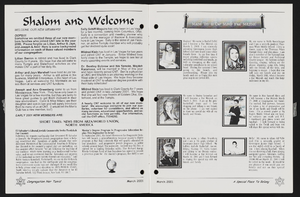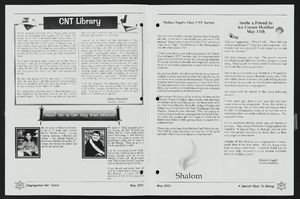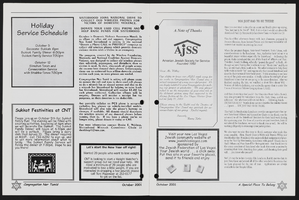Search the Special Collections and Archives Portal
Search Results

Nicole Charlton oral history interview: transcript
Date
Archival Collection
Description
Oral history interview with Nicole Charlton conducted by Barbara Tabach on May 23, 2018 for the Remembering 1 October Oral History Project. In this interview, Charlton discusses her early life in Carlin, Nevada and relocating to Las Vegas, Nevada in 1990. Charlton is the Executive Secretary to the Clark County Coroner John Fudenberg and was among the first from the Coroner's office on the scene of the Route 91 shooting in Las Vegas.
Text

Sara Kalaoram oral history interview: transcript
Date
Archival Collection
Description
Oral history interview with Sara Kalaoram conducted by Alexandra Arabshian on November 15, 2021 for Reflections: The Las Vegas Asian American and Pacific Islander Oral History Project. Sara Kalaoram shares her immigration story to the United States from Singapore in 2002 at the age of four. She talks about her upbringing in Las Vegas, Nevada, her education from Arizona State University, and her work with the Culinary Workers Union and with Assemblyman Steve Yeager as his campaign manager and executive assistant. Sara Kalaoram discusses cultural differences between Singapore and the United States, the immigration stories of her parents, and her experience as an Asian-American immigrant in the twenty-first century.
Text

Transcript of interview with Rachel Gibson by Kay Long & Caryll Batt Dziedziak, August 25, 1998
Date
Archival Collection
Description
Rachel Gibson was the granddaughter of Nevada pioneers. Her maternal grandparents, George Rammelkamp and Anna Dougherty, were among the earliest white residents of northern Nevada, settling first in Dayton and later Yerington. Her mother, Clara Angelina, and her two aunts, Elizabeth and Georgie, graduated from the University of Nevada at the turn of the century. Clara taught in Yerington for a number of years before marrying Chase Masterson, a dentist. Rachel was born in 1913 in Yerington. The eldest of three children, she continued the tradition of women’s learning and education that began with her mother’s generation. Her 1930 class was the first to graduate from Las Vegas High School, and soon after Rachel moved to California to attend college. Although her father had counseled her to study law, Rachel chose the field of economics. She received her Bachelor’s degree from the University of California at Berkeley, and worked in San Francisco for one year before returning to complete
Text

Transcript of interview with Irene Fisher and Roberta Gang by Barbara Tabach, September 29, 2016
Date
Archival Collection
Description
Las Vegas has been home to Irene Fisher (1940 - ) since the early 1970s. It felt like home as she connected with the Jewish community, including a dear friendship with Roberta ‘Bobbie’ Gang, who sits with her during this interview. During their oral history conversation, the seemingly common concerns of any mother are touched upon. In their case they were young Jewish women looking out for the well-being of their children. They cover a range of topics, from b’nai mitzvahs to Hanukkah to shopping in those years of raising children, being active in the community, and maintaining career paths. Irene begins by describing her ancestral background that includes parents who emigrated from Poland to New York. In New York she met and married a young doctor who she followed to Nellis Air Force Base. Irene was a recent graduate of Brooklyn Law School. In Las Vegas, though Irene did not practice law here, she immersed herself into civic contributions. Chief among those was with the Clark County
Text

Harold McKay interview, March 13, 1981: transcript
Date
Archival Collection
Description
On March 13, 1981, Dana Jamerson interviewed Harold McKay (b. July 27th, 1903 in Dresden, Kansas) about his life as a teacher in Las Vegas, Nevada. McKay speaks about his education, his move from Chicago, Illinois to Las Vegas and how he began his career in education. McKay focuses on how and why he founded the Teacher’s Credit Union, his time working in administration and his business school, as well as the problems related to segregation and integration in the educational system. Lastly, he talks about the growth of the gaming and entertainment industry in Las Vegas, and his volunteer work with the Senior Citizen Center.
Text

Transcript of interview with Julie Menard by Joyce Marshall, March 17, 1996
Date
Archival Collection
Description
Julie Menard began her career as a showgirl in 1964, performing in the Folies Bergere at the Tropicana Hotel. Although she appeared in the show for only sixteen months, she offers an insider’s view of the early Las Vegas entertainment scene. She describes a period when showgirls were treated as local royalty and “the boys” wielded considerable influence. Menard’s narrative sheds light on the glamour and complexities of the showgirl. Her descriptions of physical characteristics of the job, the day to day work schedules, the expectations of physical beauty, as well as the stigma of her occupation outside of Las Vegas offer a fuller view of the job. Menard left Las Vegas in 1966 to pursue a film career in Europe but like many Las Vegas entertainers, she returned to make the desert city her home. Although her brief performing career failed to prepare her for future employment, she relishes her brief experience as a showgirl. Her narrative evokes the glamour, excitement and mystery of Las
Text

Lillian Morrison interview, 1996: transcript
Date
Archival Collection
Description
Lillian Morrison was the first uniformed female who worked for Park Service and has worked for Reclamation for 20 years during the war at Camp Williston. Morrison recalls life in Boulder City during the late 1930s and 1940s. Morrison is the wife of Lloyd Shorty Morrison.
Text



